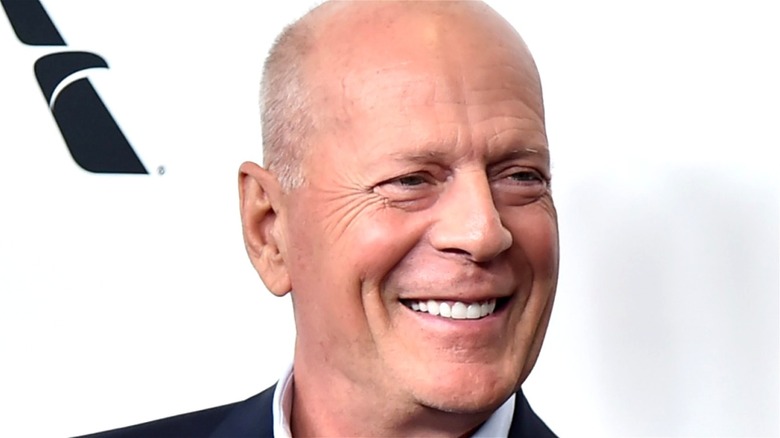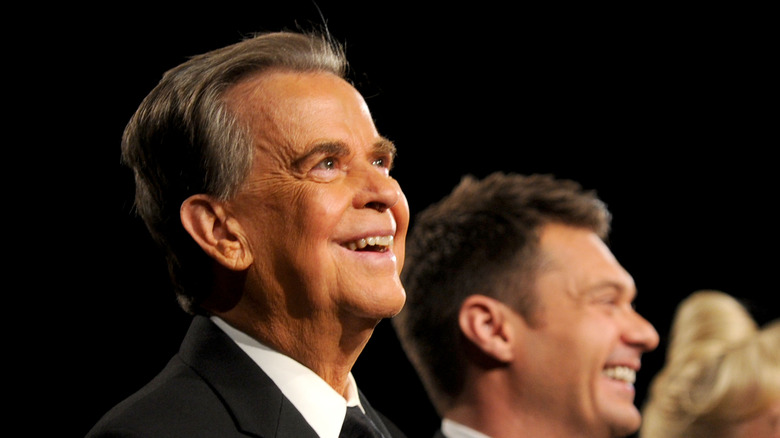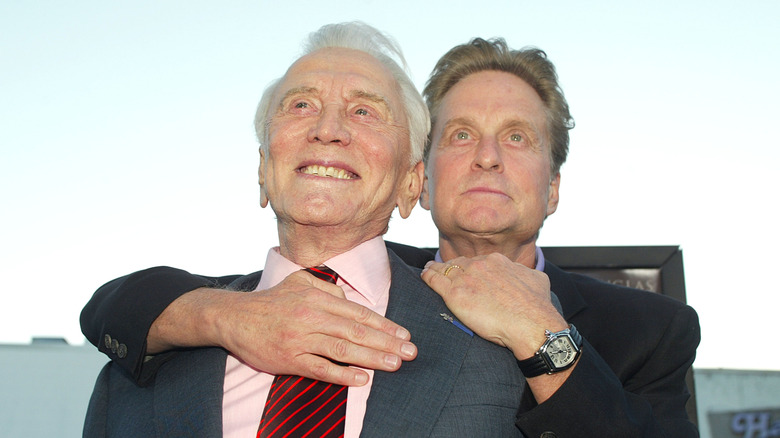Celebrities Besides Bruce Willis Who Have Had Aphasia
Bruce Willis' legendary acting career has come to a tragic end, with the 67-year-old "Die Hard" star being diagnosed with aphasia. After his family announced Willis' retirement this week, stories began popping up everywhere explaining exactly what aphasia is and how it affects a person's ability to perform and communicate. But another thing that many people wondered was who else in Hollywood, if anyone, had suffered from the language disorder before in the past?
According to John Hopkins Medicine, people who are diagnosed with aphasia have experienced damage "in a specific area of the brain that controls language expression and comprehension." This can be caused by an injury, stroke, brain tumor, infection, or dementia. "Both men and women are affected equally, and most people with aphasia are in middle to old age," a John Hopkins description reads. "There are many types of aphasia. These are usually diagnosed based on which area of the language-dominant side of the brain is affected and the extent of the damage."
In Hollywood, there have actually been multiple instances of actors having to either step away or work through the symptoms of aphasia, with many sharing their struggles publicly. Below we take a look at some of these people and their stories.
Emilia Clarke was diagnosed with aphasia after suffering two aneurysms in 2011
Not long after filming Season 1 of "Game of Thrones," then 24-year-old Emilia Clarke suffered two life-threatening brain aneurysms, which left her with aphasia (via Los Angeles Times). The future "Solo: A Star Wars Story" star revealed her diagnosis in a 2019 essay for the New Yorker, saying she had made a full recovery. However, things were apparently really bad at one point.
"In my worst moments, I wanted to pull the plug," Clarke wrote in her New Yorker essay. "I asked the medical staff to let me die. My job — my entire dream of what my life would be — centered on language, on communication. Without that, I was lost." According to Clarke, she got sent back to the ICU and "after about a week, the aphasia passed." She was able to speak and recall information again. "But I was also aware that there were people in the beds around me who didn't make it out of the ICU," Clarke said.
As pointed out by John Hopkins, aphasia can often get better over time, but "many people are left with some loss of language skills." Things can be done to treat the condition, such as speech therapy or the use of tools, like computers or phones. It all just depends on what has caused the aphasia and how bad the brain damage is.
Dick Clark got hit with aphasia diagnosis after suffering a stroke in 2004, continued to carry out hosting duties
Known for his "New Year's Rockin' Eve" countdown shows and other hosting duties, former "American Bandstand" and "Pyramid" frontman Dick Clark was a known aphasia sufferer who had to relearn how to walk and talk following a reported stroke in 2004 (via LA Times). Clark went on to become a beacon of hope for people in the stroke community after muscling his way through his treatment and continuing his yearly hosting gigs.
"I watched him year by year on the countdown show, and I could see small but steady improvement year after year," Dr. Larry Goldstein — professor of medicine and director of the stroke center at Duke University — told the LA Times in a 2012 interview following Clark's death from a heart attack. "That's important to patients who wonder if they are going to recover, or wonder whether all the therapy and hard work is worth it," said Dr. Goldstein, who also serves as the spokesman for the American Stroke Association. "Here's a guy who refused to quit, he said, 'I'm going back out there.' He was such an inspiration to so many people."
As pointed out by the Times in its 2012 story on Clark, stroke victims and aphasia sufferers will often retire, remove themselves from public life, and "become isolated" — especially celebrities. But Clark refused. "He told the world, 'It's OK. You can go on from this,'" said Jim Baranski, chief executive of the National Stroke Assn.
Kirk Douglas also proved that there's life after aphasia diagnosis
In 1996, Oscar nominee and Honorary Academy Award winner Kirk Douglas — father of actor Michael Douglas — suffered a stroke that reportedly impaired his speech and "changed his relationship with language," according to the National Aphasia Association.
"I learned that we take too many things for granted in this world — even speech," Douglas explained in a 2007 interview with NIH Medline Plus Magazine. The "Spartacus" star reportedly called his stroke and aphasia diagnosis "a blessing in disguise" (via NAA). "We think our thoughts and then we have no difficulty saying it in words," Douglas explained. "I have begun to appreciate the gift of life. Of course, I do my speech exercises every day. When I asked my speech therapist how long would I have to do my exercises? Her answer was, 'until you die.'"
Douglas went through 23 years of recovery before his eventual death in 2020 at age 103, the NAA reports. He told the LA Times in 1999 that he would often suffer from bouts of depression in addition to his aphasia. "I would pull down the blinds, crawl into bed and cry," Douglas said. But still, it didn't stop him from working or being seen in public. "I made two films with impaired speech," Douglas wrote in his 2002 memoir, "My Stroke of Luck" (via LA Times). The screen legend added, "Now I am waiting for another part to play before the sun sinks below the horizon. You can't stop an actor."
Music legend Randy Travis is an aphasia sufferer who continued to perform and release songs after 2013 stroke
Much like the people we just mentioned, country singer Randy Travis is also someone who continues to do what he loves despite suffering from aphasia caused by a 2013 stroke (via Insider). Travis has performed publicly since, and in 2021, released his first song following the health incident, titled "There's a New Kid in Town." But not everything has been easy for the Grammy winner, who discussed his language and speech struggles in a 2019 memoir, "Forever and Ever, Amen: A Memoir of Music, Faith, and Braving the Storms of Life."
"I wanted to shout as loudly as I had ever bellowed, yet no words formed, no sound came out of my mouth," Travis explained (via Insider). "A single tear trickled from my eye and down my face as I mustered every ounce of energy I had. I squeezed [his wife's] hand. She knew. We both knew that my life was in God's hands."
According to the National Library of Medicine, researchers have found that people who suffer from aphasia will sometimes find it easier to sing than speak. Travis' wife, Mary Davis Travis, told People magazine in 2017 that "everything's up there," in terms of the singer's memory, "It's just the aphasia [loss of speech] and getting it out that's the frustrating part." And if there's anybody who knows about the frustration of having to deal with aphasia, it's our last celebrity...
Sharon Stone had to learn to read and write again after stroke and aphasia diagnosis
In 2001, "Basic Instinct" star and Hollywood icon Sharon Stone suffered a massive stroke that, according to her, left the longtime actor with a "nine-day brain bleed."
"Learning to read and write again, that was a humbling experience," Stone told the LA Times in 2018. "I took smaller parts and built up a body of work completely different from the thing I got stuck into by the part where I wasn't taken seriously," she adds, referencing her role as Catherine Tramell in "Basic Instinct."
According to the National Aphasia Assn., Stone suffered from speech impediments as a result of her stroke — including a stutter. But she learned to work and live around it. "I became more emotionally intelligent," Stone told Harper's Bazaar in a 2015 interview. "I chose to work very hard to open up other parts of my mind. Now I'm stronger. And I can be abrasively direct. That scares people, but I think that's not my problem. It's like, I have brain damage; you'll just have to deal with it."
While many celebrities have continued their careers post-aphasia diagnosis, that is not to say there is anything wrong with Bruce Willis's choice to retire and live his life as he pleases, and many in Hollywood have expressed their support for his decision.





